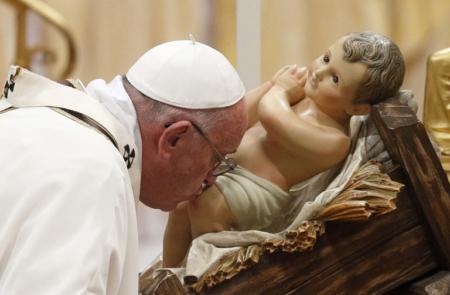The Logos was made flesh
It's already a mark of Pope Francis' pontificate I think that he wants the agenda of the Church to be set by a logic internal to Christianity, not imposed from without by the world, even by the necessities of the latest battle in the culture wars.
In this regard he corrects a misreading of the Second Vatican Council, which frequently invoked the "signs of the times." One might have supposed, wrongly, that Catholics should therefore set their sights by those signs. Not so: the first task of the Council was for the Church to renew itself by drawing on its ancient springs and deep resources. Yes, of course, having done so, it would discover that what it possessed all along, and the "new things" too which it drew from its storehouse, would serve marvelously as an answer to the "signs of the times." But being a Catholic today, the Council taught, must be above all a matter of returning to ancient sources, "ressourcement."
My hunch is that Pope Francis does not have to "try" to connect Vatican II to the Church's ancient traditions, in accordance with a "hermeneutic of continuity," because his embodiment of the core of Christianity is already pre-modern. He is concerned with the scare of global warming, not as a fad but as someone who has loved nature all along with a 12th century sensibility. By the same token he does keep watch over his words and deeds to avoid seeming to "signal" some kind of discontinuity.
I say all this in connection with Christmas. (Is your tree still up? We are still in the Christmas season, after all, until the Baptism of the Lord, or, if you want to imitate the Vatican, until the Feast of the Presentation, Feb. 2.) Let's face it: there is no religious holiday of Christmas in our society any longer. No public assembly has religious content. Public school "winter assemblies" are vapid. The malls are entirely commercialized. Santa Claus has become disgusting. The Wall Street Journal last month ran an incisive op-ed, "The End of Christmas," about how the famous storefront displays on New York's Fifth Avenue are now given over to depictions of pagan deities, witchcraft, and drunken and immodest revelries. Christmas as a cultural reality is no more.
So what does a Catholic do in the situation? It's pointless to address this phenomenon at the boundaries, by replying to "Season's Greetings" with an aggressive "Merry Christmas," or patronizing only stores which have angels or a creche. By all means, give extra attention to traditions within the family. Use an Advent wreath and calendar. Celebrate Christmas counter-culturally, beginning on Christmas and lasting 12 days or more. Sing and even memorize the old carols.
But even such a response is woefully inadequate, for two reasons. First, the solution does not match the problem. Secularization -- the problem of "modern atheism," arguably the chief worry of Vatican II -- has deep roots going back to the Enlightenment, and before that medieval nominalism, but most fundamentally in man's fallen nature and alienation from God. We are dealing with something that cuts to the core of the human condition. It is propelled, as Pope Francis never ceases to remind us, by the urging of evil spirits. So, to cling to nostalgic songs and consoling symbols from Victorian England is hardly the answer. (Besides, most of our "venerable" Christmas traditions are not more than 150 years old. The creche is a noteworthy exception.)
Second, traditions are not dogmatic, and we need dogma. Christianity is "I believe in ..." The martyrs believed not in divinized Caesar, but in Christ the Son of God who "was incarnate of the Virgin Mary." No one has yet died for "Silent Night" or a wreath.
The very best of our Christmas traditions is found in our carols. But pause some time and think about these. They fall generally into four groups: carols which celebrate the "translation of values," that is, how the poor, weak, and lowly are privileged at the nativity (as in nature); those that meditate on the beauty of mother with newborn child (always beautiful, but magnified in Mary and Jesus); those which express goodwill and general good cheer (always to hand but usually buried under anxieties); and those that mention wonders and portents -- the star, the angels in the sky, the visit of the Magi. None of these ideas is specifically Christian. Maybe once every 20 verses will the logic of the incarnation get a mention. Most carols refer to it not at all, some on principle, like the Unitarian carol, "It Came Upon a Midnight Clear." (What's the "it"?)
I mention the "logic of the incarnation," which brings me to my point. The logos became flesh: logic, reasonability, argument, assertion, claim, plan, understanding, wisdom. It makes sense that, as the Logos approached us by taking on a mortal body like unto our own, so we must approach him not simply through sight and touch but also through understanding. You catch a fish by its head: the renewal begins here. Why did God become man? Do we "see" the incarnation as a dearly sought solution to a cosmic puzzle about creation, life, death, judgment, and the sentence of death?
That is how the Fathers saw it. Perhaps, if we want to stand "contra mundum," our answer to "Seasons Greetings" should be a prolonged meditation on St. Athanasius, "De Incarnatione."
MICHAEL PAKALUK, PROFESSOR OF PHILOSOPHY AT AVE MARIA UNIVERSITY, IS AN ORDINARIUS OF THE PONTIFICAL ACADEMY OF ST. THOMAS.
- Michael Pakaluk is Professor of Ethics and Social Philosophy in the Busch School of Business at The Catholic University of America. His book on the gospel of Mark, ‘‘The Memoirs of St. Peter,’’ is available from Regnery Gateway.



















